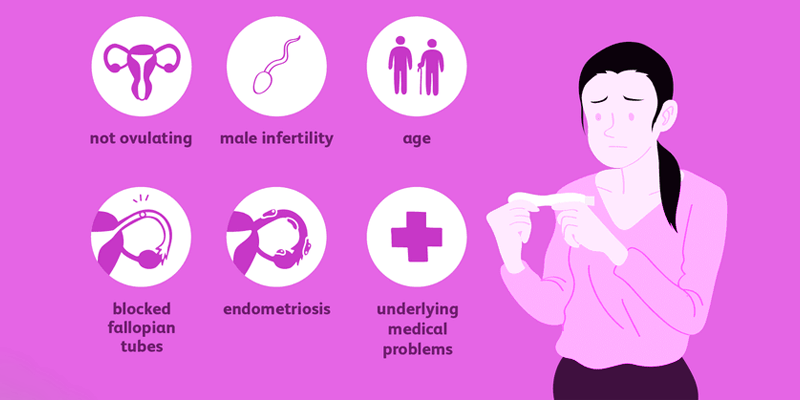Infertility affects millions of couples worldwide impacting their families and communities. Various factors including medical, genetic, environmental, and lifestyle factors contribute to infertility. With the help of several advanced infertility treatments, couples can achieve parenthood and have their own biological child. Fertility declines with age both in men and women. Hence it is very crucial to avoid delays or postponement in seeking treatment. If certain medical reasons or career planning necessitates postponement of parenthood, the individual or couple can opt for fertility preservation.
Fertility Preservation is an advanced technique that helps to cryopreserve women’s eggs, and men’s sperm or couple’s embryos for future use.
When is a couple said to be facing infertility?
If a couple is unable to achieve pregnancy after a year of unprotected intercourse they need further evaluation. Both male and female partners can contribute to infertility. There are many factors affecting fertility in both men and women.
Risk factors of infertility in women:
- Age
- Alcohol consumption
- Obesity
- PCOS
- Endometriosis
- Tubal disease
- Uterine anomalies
- Sexually transmitted diseases
- Cancer
- Thyroid disorders
Infertility Testing for women:
If you have painful, irregular or heavy periods and are unable to conceive, it is essential to consult a fertility specialist.
The following are done as part of infertility testing for women:
a. Blood tests- Levels of certain hormones like Follicle stimulating hormone, Lutenizing hormone, Estradiol & Thyroid hormones are checked that can provide vital information about infertility issues.
- Ultrasound –This is an imaging procedure that is used to examine the uterus, ovaries, fallopian tubes, and pelvic area.
- Tubal Testing – The tubal patency can be ascertained by various tests like hysterosalpingography, saline infusion sonography or laparoscopy.
- Hysteroscopy and Laparoscopy – The uterine cavity, uterus, tubes and ovaries can be assessed.
- Genetic testing – Genetic analysis of both partners may be done to ascertain the genetic etiology of infertility. It also helps to diagnose certain medical conditions that can be inherited from the parents to the children.
Female infertility treatment
- Lifestyle modifications – Quitting smoking and alcohol, exercise, and healthy weight management can improve fertility
- Medicines- Tablets and/ or injection to help make the eggs
- Surgical management – Laparoscopic or hysteroscopic surgery to correct uterine abnormalities, fibroids, and blockages in the fallopian tube may be needed by certain couples.
- Advanced Fertility treatments – IUI, IVF, IVM may be needed by the couple depending on the cause of infertility.
Risk factors of infertility in men:
- Infection – systemic or urogenital
- Smoking
- Varicocele (swelling of veins in the scrotum)
- Obesity
- Diabetes
- Exposure to toxic chemicals
- Genetic problems
- Undescended testicles (birth defect)
- Hormonal imbalance
Test of male fertility
- Semen Analysis – This gives us information regarding the sperm count, motility and morphology.
- Ultrasound – Scrotal ultrasound helps to diagnose varicocele and any abnormalities.
- Blood Tests – Levels of certain hormones like FSH, LH, and Testosterone, are evaluated. Follicle stimulating hormone, Lutenizing hormone, and Testosterone are checked
Male infertility treatment
- Lifestyle Modification – Reducing weight, having a balanced diet and proper sleep can improve fertility potential
- Neutraceuticals – supplementation of certain vitamins and antioxidants help to improve sperm parameters.
- Hormonal medicines – certain hormones may be needed to improve the sperm production or correction of any imbalance.
- Sperm retrieval techniques – Sperm retrieval techniques like TESA (Testicular Sperm Aspiration), Micro-TESE (Microscopic Testicular Sperm Extraction) can help retrieval of sperms even from men who have obstructive azoospermia or in cases of very low sperm count.
- Assisted reproduction techniques – like IUI procedure, IVF procedure can help male factor infertility. Advanced sperm selection methods like MACS (Magnetic Activated Cell Sorting) and Microfluidics improve fertility outcome.
What is an IUI procedure?
IUI/Intrauterine Insemination is used in the case of mild male factor infertility, ovulatory dysfunction, mild endometriosis or unexplained infertility. In this procedure, the semen sample obtained from the male partner is washed and processed and inserted in the woman’s uterus to improve the chances of conception.
What is an IVF?
IVF/In vitro fertilization is a process in which eggs collected from the female partner and sperms collected from the male partner are fertilized outside the woman’s body in the lab. After fertilization, the embryo formed is transferred into the woman’s uterus for further growth and development.
Few tips for a healthy pregnancy:
If you are planning to conceive:
- Know about your fertility window (Have a good idea about your periods)
- Have a healthy diet
- Quit smoking and alcohol
- Maintain a healthy weight
- Focus on mental health- Avoid stress
- Develop a hobby
- Get into a regular exercise regime
If a couple is facing difficulty in conceiving, it is very crucial for the couple to meet a fertility specialist for further evaluation. Individualized and timely intervention can help- couples realize their dream of parenthood.

